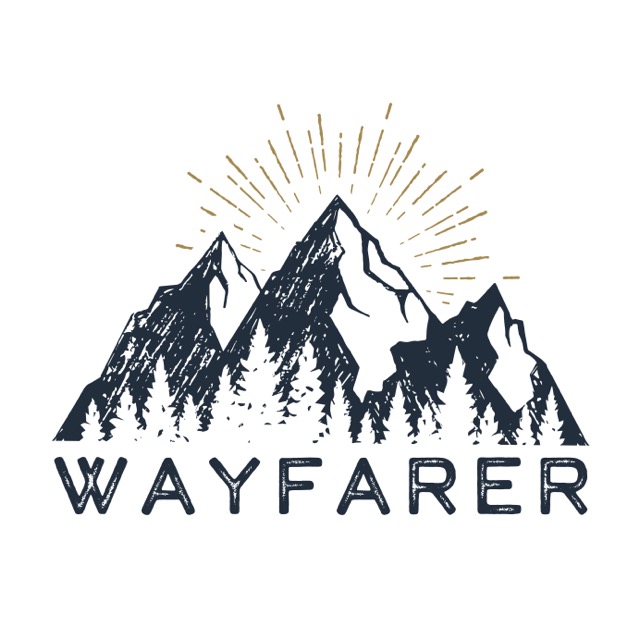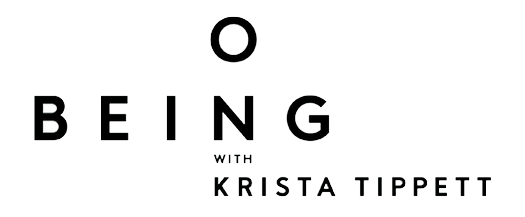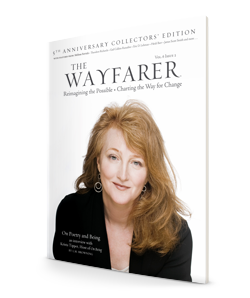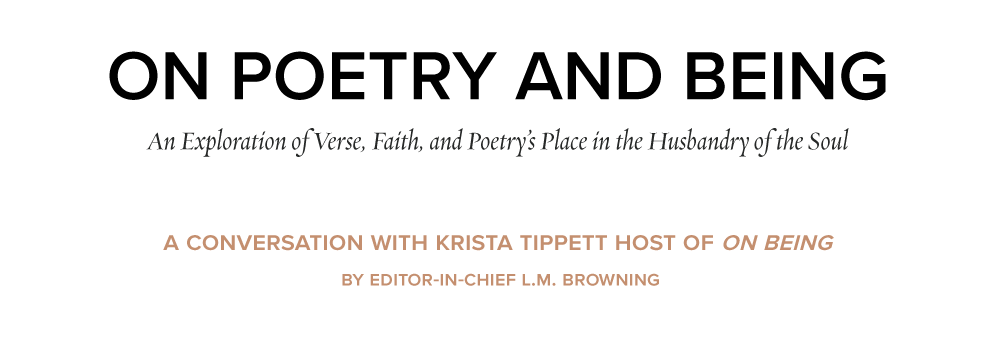
Krista Tippett graduated from Brown University in 1983. After earning her degree, she traveled on a Fulbright scholarship to study at the University of Bonn in West Germany, where she wrote for The New York Times in divided Berlin as a freelance foreign correspondent.
Krista went on to earn a Masters of Divinity from Yale University in 1994. It is said that, while conducting a global oral-history project for the Collegeville Institute for Ecumenical and Cultural Research at St. John’s Abbey of Collegeville, Minnesota, she began laying out the idea of what would go on to become her radio show, On Being.
Tippett would also go on to found “The Civil Conversations Project,” which she has described as “an emergent approach to healing our fractured civic spaces”. In 2008, her efforts in Speaking of Faith-The Ecstatic Faith of Rumi would win her a Peabody Award and then, in 2014, she would go on to win a National Humanities Medal at the White House for “thoughtfully delving into the mysteries of human existence.”
Interwoven throughout each of these endeavors and indeed her faith itself has been poetry. I had the immense pleasure of sitting down with Krista this past summer to discuss the place poetry holds in her personal philosophy and where the roots of it run in her soul.
Leslie: In many of your interviews, you like to start by giving the spiritual background of someone’s life. And while the focus of our interview today is your use of poetry throughout the discourse of your work, I think we can both agree that spirituality and poetry are inherently alike. So, I’m going to start where you usually do, and ask you to just give a very brief spiritual background of your life.
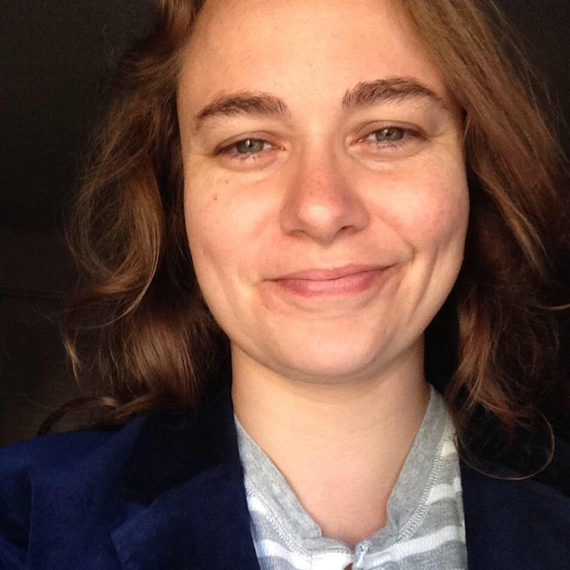
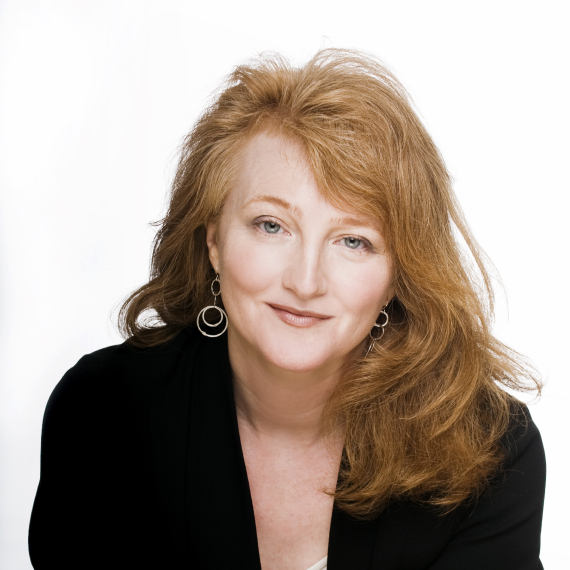
Krista: Well, one thing I like about that question is that the answer changes over one’s life. Over time, one thing that’s happened is I’ve learned I have a very expansive understanding of the spiritual background in someone’s life, which may be about religious formation or lack of religious formation. I think about spiritual life as interior life, and questions of meaning that live in us and that we follow.
I was actually just back in town—in my very small town in Oklahoma. . . there was a lot of religion in my background, that was hugely formative. Also, in this context of poetry, I think I was spiritually starved growing up of ideas and beautiful language, and something like poetry and literature.
So sometimes when people imagine that I have this great education, and this great grounding . . . I’m the opposite story. I’m the person who was never exposed to this stuff until I was really old, and then I kind of discovered it and couldn’t believe how long it had taken.
Leslie: What was your first experience with poetry?
Krista: Yeah, that’s a good question. Again, I was not raised in a kind of literary atmosphere at all, or a home which had many books in it, or certainly not a home where people read poetry aloud.
I kind of think, it was growing up in the 60s and the 70s . . . For some reason, I remember E. E. Cummings. So maybe I saw some poetry that was playful. But I honestly don’t think I read much poetry until I got to college. And I suppose the first poet who I felt like was a soul friend was Rilke . . . I discovered Rilke when I was living in Germany.
Leslie: It’s funny, you should say that. Rilke was the first poet I bonded with. I read, like so many people, Letters to a Young Poet and that was it. I was hooked on poetry.
Krista: Yeah.
Leslie: I mean, like so many other poets, that’s kind of a very coming of age story for so many writers I think.
Krista: It really is.
Leslie: You gravitate towards poetry, the work of Mary Oliver and Wendell Berry and Marie Howe and Rumi and as you said, Rilke to name only a few, are interwoven throughout all of your books, and On Being.
Several figures you interview bring poetry into their responses, recognizing this, at one point you even assembled all such poems into episodes of On Being, the Poetry Project. What inner questions do you feel you’re seeking the answers to when you sift through poetry?
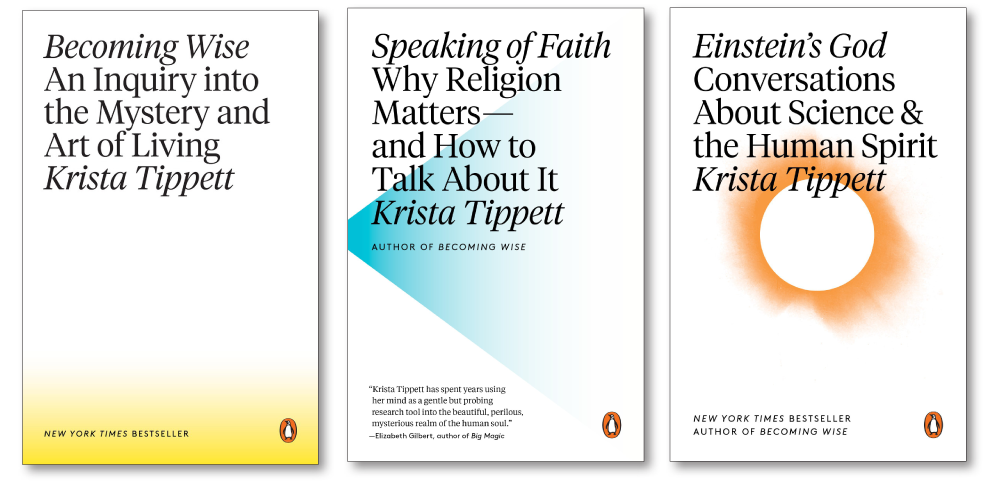
Krista: Well, one thing I would say just is that I have gravitated more and more towards poetry, and that the show has gravitated more and more towards poetry. So, I think you would find this in the early years, but it’s a very defining, recurring place now in my work, and in what I’m looking for in the world, and in what I’m listening for. I think, I wouldn’t say that it’s so much about a particular set of questions as it’s about poetry’s capacity to raise questions, and make observations using words and using forms of language that give those questions and those observations a different kind of heft, and make them ponderable. I don’t know if that’s a word . . . [laughs]
Leslie: Well we can make it a word. [Laughs]
Krista: Yeah. And I think that I’ve turned more towards poetry, as many people have, because the forms of speech that are more common are just so broken, and so bad for us. So, poetry, I wouldn’t just say that poetry is an antidote to that, I would just say that we are rediscovering our need for language that gives us truth in a different way.
Right now, we have this kind of crisis of truth. But I actually think that the crisis is out on the surface. I think we’ve been moving towards it for a long time. And one of the ways we’ve been moving towards it is through this over-reliance on facts. And way too much confidence in what facts alone could ever convey.
Leslie: Certainly.
Krista: And now, again, that’s just out on the surface. I think a lot about a few things. I think a lot about Elizabeth Alexander saying to me that, “every line of a poem is not true.”
In terms of another question, like “Did this really happen,” or “Is it about you?” That every word and line of poem is not true, but that poetry gets at undergirding truths. And that’s a really good way to talk about what we actually don’t know how to discuss or put words around in our public life right now. We have no vocabulary for undergirding truths, to break through the competing facts and the thing I thought a lot about that helps me understand why poetry has become just that much more valuable is something David Whyte said to me just last year that, “poetry is language against which we have no distance.” And right now, again, if I think about the different battles of our time, one of them is just this battle with defensive and offensive language. That’s another way to understand how poetry cuts through that. And it still does, right? This is language also that makes you be silent, and just that is counter-cultural right now.
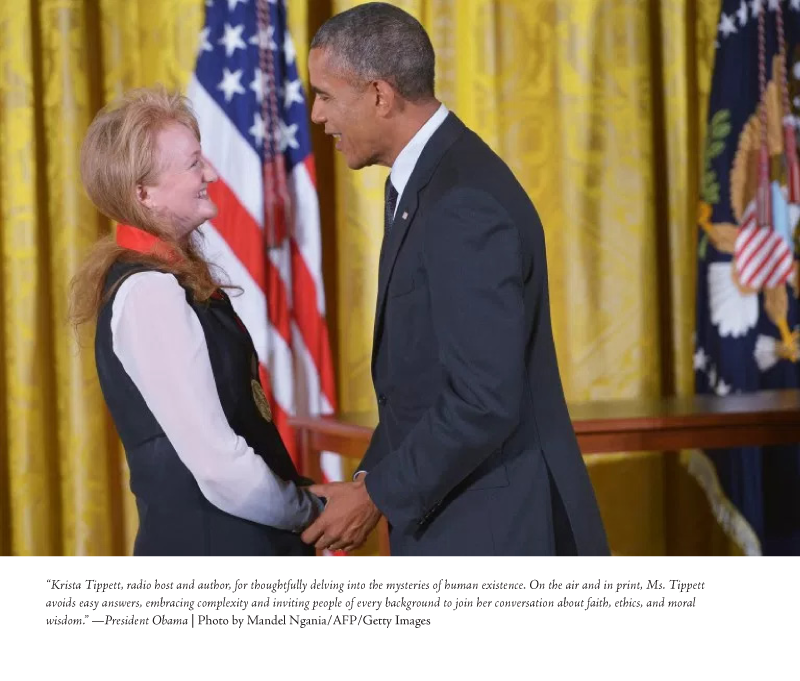
Leslie: That couldn’t be more true. Speaking of the current world climate, I just wanted to touch on a few of your memorable interviews with poets. You had a very poignant discussion with John O’Donohue two months before his death.
In that conversation, you discussed the importance of developing the inner landscape to keep us healthy in the midst of bleak surroundings and experiences. In the light of the current world climate, I can think of no more timely practice. What were some of the insights to tending to that inner landscape that you feel that you got from John, or have come to in your own time since? Where does poetry enter into the husbandry of the soul?
Krista: Well, in so many ways, right? There are the obvious ways, and then I think there are the less obvious ways. We were just talking about silence and stillness, and I think about years ago, I interviewed this individual whose mission it is to protect the last quiet places in the world, you know?
Leslie: Wow.
Krista: Say things like, “Silence is a laboratory for the soul.” Which is a lofty way to talk about the experience we’ve all had, and we know in the world around us.
There’s certain insights, and there’s certain kinds of growth and learning that you just have to get quiet inside to make room for. And poetry does that.
You know, poetry is not easy. It’s not easy. It’s not entertaining. It can be soothing, but even when it’s soothing it’s asking something of you. Asking to soften up and open up … And that also is a hallmark of inner-life too, there’s a little bit of work involved.
Leslie: Certainly and that is what makes poetry great.
Krista: Right? I remember having this conversation with Marie Howe and saying to her, “I sometimes feel like I have to be either wrecked enough or strong enough to read poetry.” And she said, “Well it hurts a little bit going in, and we’re so trained, culturally, to turn to things that don’t hurt going in,” right?
Leslie: Absolutely!
Krista: That make us feel better, or distract us. So, really, it’s in so many ways both direct and indirect, it opens us for growth. And I think also, beauty, beautiful language. By which I don’t necessarily mean sweet or frilly, you know what I mean?
Leslie: Yes. I do.
Krista: Beautiful language can also be angular, and heavy, and hard. I think beauty is an element. I don’t think poetry is optional. It holds some kind of reverence for beauty for inner-life.
Leslie: I mean, right now, we’re all starved for meaning, beauty, eloquence—those things that bring us to a moment of pause and awe, and awareness.
Krista: Yeah.
Leslie: And I think poetry certainly aids in that. As we talked about earlier, when I was 26, I read two books that changed my life. And it was Rilke’s Letter to a Young Poet, and his Book of Hours. After eight years of studying world religion longing to find a transcendent moment, I experienced it through poetry.
Krista: Yes.
Leslie: In your book Becoming Wise, you say that Rilke became your friend across time and space, and that you were drawn, among many things, to his idea of living the questions. Verse is interwoven into countless spiritual texts, the Bible, the Quran, the Bhagavad Gita . . .
Krista: Absolutely.
Leslie: I believe that poetry shows its inherent sacredness when used to voice the ineffable. And, in Speaking of Faith, you say, “In many ways, religion becomes the same place in us that art comes from. The language of the human heart is poetry.” Do you hold poetry collections alongside those sacred texts? Do you think that poetry has the capacity to guide the soul in the same way that spirituality and religion does?
Krista: I do. And I think that’s such an important point that you’re making. I mean, sure, we could have a really complex conversation about how poetry engenders, spiritualizes, and speaks to this part of us and comes out of this part of us … But the truth is, as you also pointed out, all of the great spiritual traditions have poetry woven all the way through them. So, there you go. Another thought that I really hang onto, that I think about a lot, is . . . I once interviewed this great theologian of the prophetic tradition. This is somebody who’s not a household name, but if anybody who has studied the prophets, the biblical prophets, who were social action figures and he said to me, “Prophets have always also been poets,” that one of the ways prophets kind of broke through the cacophony of what was happening culturally is to speak in disarming language. That their language is powerful poetic language. And of course, if you read the speeches of Martin Luther King, Jr., right?
There’s poetry in there, even while he’s making these strong political points. So, yes, absolutely, somehow, poetry emerges from and speaks to the spiritual aspect of us in the most expansive sense of that language. But I also think it helps bring that into the light of day of our lives in the world. I think it’s a source of nurture for continuing to live with the outer world and all of its complexity. And I think that’s one reason that the election of 2016 turned out as it did. You’ve got this surge of people reading poetry and gathering to read poetry, and downloading poetry from the internet.
Leslie: Certainly.
Krista: So it’s never merely interior.
Leslie: Oh no. I just read an article asking, “Where are all the poets right now?” Because of all the protests and uprising since the election, and the call for that poetic voice that we had in former generations. And most people don’t realize that it’s there, that we’re here—we’re screaming—but the media machine is louder.
Krista: Absolutely.
Leslie: In closing, I reflect back to something you wrote in Becoming Wise. You say, “I’ve come to understand the cumulative dialogue of my work as a kind of cartography of wisdom about our emerging world.” Taking the hundreds of intimate conversations you’ve had with contemporary poets of our day, and your gathered appreciation for poets of the past, have you distilled a set of mile-marker truths on your own personal map that poetry has taught you? I mean, looking back, is there something that stuck out, that poetry or a certain poet has taught you over your life? Like when you connected with Rilke, obviously that was a mile-marker truth on your inner-map. Can you speak to that particular one, or think of others that have come along?
Krista: Well, maybe kind of jumping off of what I just said, the conversation I had with Elizabeth Alexander, which was back in 2010, has just continued to be a real tethering point for me. One of the things we talked about is how poetry is a way to raise questions, which is important to me.
I think of Elizabeth Alexander, a couple of questions that she’s raised by way of poetry that are just very present to me now, and I’m really working with them. It is this aspect of our project that we call the “Civil Conversations Project.” These questions kind of epitomize everything that we’ve been talking about—about what is it that poetry does that other forms of language don’t do.
So, there’s a poem she wrote years ago, which ends with a question, “Are we not of interest to each other?”
I quote that probably in every speech I give about Civil Conversations. For the project, we’ve created a guide and it’s in there, because it cuts through all of the very busy ways we have right now of talking past each other, and fighting with each other, and talking, but in fact not conversing, and not listening. And it’s a question I wish I could just throw out into the halls of congress, and just throw at into gatherings as a new framing. We still do have really hard things to work on and talk about together. But, what if we let our coming together be framed by that kind of question, “Are we not of interest to each other?” What if we started there?
Then another question that she raised, actually, in her poem Praise Song for the Day at the first inauguration of Barack Obama, “What if love were the mightiest word?” That’s just, it’s not . . . I thought it was an audacious question to ask in a political moment. And I don’t think it could be asked except in the form of poetry. And there it is. And to me, that’s another question that if we let it roll around in our midst, if we let it affect the way we approach each other in the way we choose our words, the way we choose our fights, it would change us.
This article is from The Wayfarer’s 5th Anniversary Collectors’ Edition
Visit our store and purchase the entire issue in print or digital format. It edition features: Wayfarer of the Issue: Krista Tippett, host of On Being. In this extended interview our Editor-in-chief L.M. Browning and Krista, discuss poetry’s role in the current world climate and its place in the husbandry of the soul. Reimagining the Possible: An Interview with Indie Singer-songwriter Melissa Ferrick. The featured photographer of the issue is James Scott Smith. The Mindful Kitchen: Acorn Squash Old Fashioned by Kristen Williams. The Contemplative Column: Contemplating Fatherhood by Theodore Richards. The Environmental Column: Light-Time by Gail Collins-Ranadive. Poetry by: Saizan Owen, Jasmine McBeath, Andrew Jarvis, Ben Colandrea, Elizabeth Bolton, David Amerman, Amy Nawrocki, Jason Kirkey, Ellen Grace O’Brian, J.K. McDowell, David Anthony Sam, Leath Tonino, Dede Cummings, Gunilla Norris, and more!
Do you want more than 1 issue? Subscribe to 1 year of The Wayfarer. Here»
To bring each issue of The Wayfarer to fruition, it takes hundreds of hours each season to craft, edit, design, and distribute the journal. If you find joy and enrichment within our features, please consider becoming a supporter with a small donation. There is no set amount. Whether it is .99 or a few dollars, we appreciate any gift you care to give. While at this time we are not a non-profit all donations do go towards ensuring the future of the journal.
Help us Empower Change by Giving a Little Change!
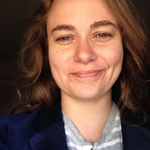
L.M. Browning
Editor-in-Chief, The Wayfarer
L.M. Browning is an award-winning author of twelve books. Balancing her passion for writing with her love of learning, Browning sits on the Board of Directors for the Independent Book Publishers’ Association, she is a graduate of the University of London, and a Fellow with the International League of Conservation Writers. She divides her time between her home along Connecticut’s shore and Boston where she is earning an L.B.A. in Creative Writing and Journalism at Harvard University’s Extension School. Look for Leslie’s next book, To Lose the Madness: Field Notes on Trauma, Loss and Radical Authenticity, Spring 2018. Visit her at www.lmbrowning.com
